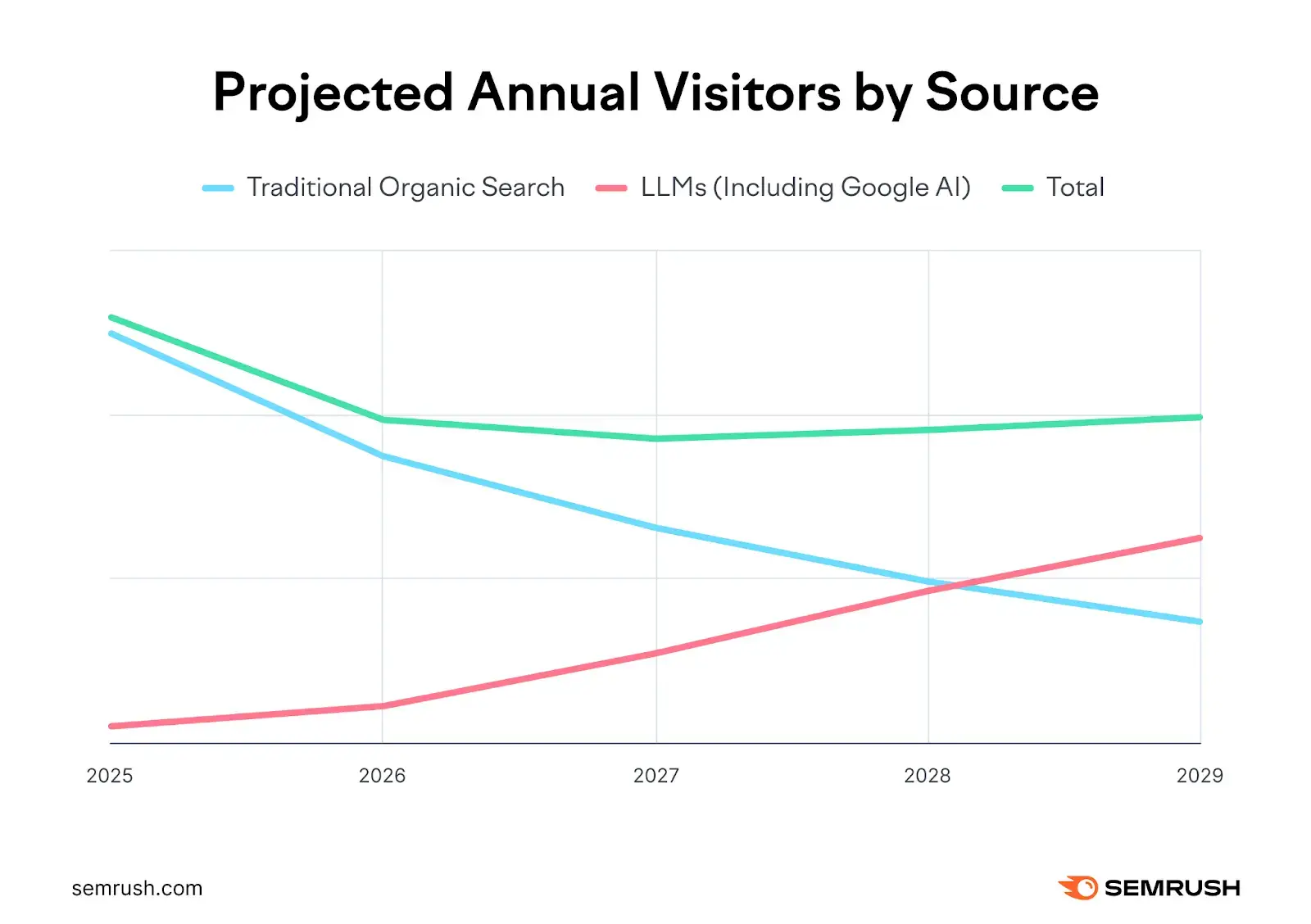AI Search vs Traditional Search: The Future of SEO
AI search is predicted to overtake traditional search by 2028, delivering x4.4 more valuable visitors on average. Are you ready for this revolution in digital marketing?
The AI Search Revolution is Here
Artificial intelligence is causing a fundamental shift in how consumers search and interact with businesses online. According to HubSpot’s eye-opening 2024 study, AI is dramatically altering how customers seek and retrieve information.
For example, BrightEdge’s Research highlighted how click-through rates have dramatically declined by 30% from May 2024 to May 2025, despite search impressions growing by 49%.
It is understood this can be attributed to the use of AI search engines as well as Google’s Gemini AI overview.

AI search vs Traditional search
How traditional search works
Traditional search engines such as Google and Bing provide ranked lists of websites based predominantly on authority and relevance. Users click through to web pages to gather information and research themselves. Traditional search simply gathers and presents information sources, whereas AI searches go one step further.
How AI search works
AI-powered search platforms like ChatGPT, Perplexity, Claude and Google’s Gemini use generative artificial intelligence to understand search intent and give conversational responses. Instead of providing a directory of website links like traditional search, AI compiles information from many sources to provide the most relevant and useful responses. Furthermore, AI search engines often place a heavy emphasis on authority score and often online discussion forums such as Reddit and Quora.
Google AI Mode: Best of Both
In May 2025, Google released its latest development into the AI market, transforming how users search on Google: AI mode.This allows for chat based conversational style searching, similar to ChatGPT, etc. This is a crucial acceleration towards AI search dominance over traditional search, allowing Google to stay in the race against its AI competitors, whilst still dominating traditional search volume.
AI Search Engine Comparison Guide
| AI Model | Positioning | When to Optimize | Levers to Pull | Positives | Negatives |
|---|---|---|---|---|---|
| ChatGPT | Broadest reach, highest user base | High-value keywords | Use FAQ/how-to content, publish stats, show E.E.A.T | Largest audience, strong brand mentions | Few visible citations |
| Perplexity | SEO-friendly, research-heavy, strong visibility | Fact and comparison queries | Quotable content, verifiable stats | Strong research query visibility, supports brand mentions | Smaller audience than ChatGPT, still developing |
| Claude | Trust-heavy, research-driven content | Deep reasoning, accurate content | Dated references, statistics, quote snippets, evergreen hubs | Direct citations, rewards long-form authority | Lower reach, avoids weak claims |
| Google's AI (Gemini) | Integrated with Google ecosystem, search-driven | Conversational, local search queries | Featured snippets, structured data, mobile-friendly, location keywords | High visibility via Google Search, supports rich snippets | Limited source transparency, algorithm-dependent |
SEMrush's Study
SemRush's study set out to outline the user trends behind AI search and traditional search. This study made an interesting discovery, that by 2028, AI search will match traditional search’s user volume.
Key Insights:
50% reduction in traditional search traffic by 2028
- 340% increase in AI-driven traffic value
- 25% change in search market share annually
Moreover, these users are reportedly 4.4x the value of traditional organic traffic. It is outlined that this stems from:
- Purchase intent: AI users arrive highly informed and more qualified.
- Higher conversion rates: Conversations with AI filter out disinterested users.
- Longer session duration: Users are typically more engaged after a conversation with AI.
The New Customer Journey
This change in consumer behaviour has profound implications for the customer journey, which will require businesses to shift their focus to benefit. Previously consumers gathered information about products or services on their own, slowly building their knowledge and developing their purchasing decisions. Now customers are provided with huge amounts of useful information summarised instantly.
As a result, highly-informed visitors are now more decisive and eager to purchase. In short, if you can win over the AI search engines, and increase your recommendations, it creates a massive opportunity for sales growth.
Case Study: How StyleCraft Grew Its Answer Share by 148%
StyleCraft, a fashion retailer, relied heavily on traditional SEO for visibility. However, their brand was practically invisible on AI search engines. For example, their competitors were cited x8 more than StyleCraft and saw no mentions for shopping recommendations.
Their success story
Applied GEO to a large product catalogue, optimising for AI search instead of traditional search.
- Began publishing authoritative, on-brand content focussing heavily on their competitiveness through product comparisons.
Results
- AI answer share jumped 148% in 6 weeks.
- Revenue from referrals grew by 293%.
- 486% increase in mentions from ChatGPT.
The New SEO Framework
Success with AI search engines requires knowledge of the four emerging strategies
GEO (generative engine optimisation) - This is when you are retrieved and cited in ChatGPT & Gemini.
AEO (answer engine optimisation) - Appear in AI search summary e.g. at the top of Google by Gemini
AIO (AI integration optimisation) - Structure content so AI tools, API’s, workflows can use it.
SXO (search experience optimisation) - Align site UX, trust and conversion with user intent
What to Expect Next
In the coming years, we may expect a significant shift away from traditional SEO as more businesses choose to focus their resources on winning over the AI search engines.
- Introduction of sponsored ad space: We may start to see AI generative models start to introduce advertising space/ sponsored content, pulling marketing budgets from traditional search ads.
- Professional demand: This will open the doors to new strategies and professions such as ‘GEO specialist’.
- Segmented usage: As this shift develops, both traditional and AI search engines may simply co-exist together, providing separate utility to both customers and businesses. For example, AI for heavy research-based queries, while traditional search for quick lookups/ summaries.
How To Future Proof Your Business
- Publish authority building content - Build high-quality, authoritative content for your audience that provides great research potential.
- Strengthen domain authority - Focus on collecting high quality backlinks from authoritative sites. This can be achieved through quality content and writing guest blog pieces.
- Optimise for AI - Use AI-friendly structures with clear h1, h2 & h3 headings, factual data/statements and expert knowledge. This helps to prove trustworthiness and authority.
- Adapt user experience - Create pages that are optimised for visitors who well researched and ready to convert. For example, landing pages with one clear call to action, surrounded by small amounts of content that assumes prior knowledge.
- Monitor your visibility: Use relevant search queries within AI search engines to test for business mentions and referrals. Alternatively, tools such as HubSpot’s AEO Grader can provide a quick visibility score for easy tracking.
Ready to Get Started?
At Livewire Marketing, we help businesses uncover content marketing strategies that amplify online visibility. Looking to elevate your website traffic? Get in touch with our team to book a free consultation.












